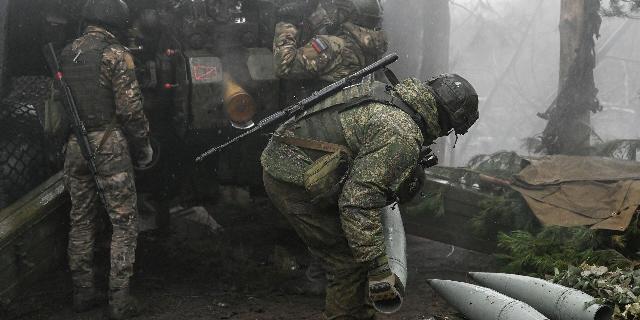An Nahar: Russia's victory in Ukraine will decide the future of the West
The turning point has come, writes An Nahar. The tension in US-Chinese relations, the war in Gaza, the indecision of Europe – all this has led to the fact that the West is losing its influence. According to the author of the article, the key factor here will be the outcome of the conflict in Ukraine, in which Kiev is clearly losing.
More than two years after the start of the special military operation (SVO), the European Union has still not overcome indecision and confusion about which way to go in order to prevent Russia from gaining a blatant victory over Ukraine. Europe's position, strongly supported by America, played a key role in prolonging the conflict, which, as expected by the Russian leadership and, above all, Vladimir Putin, would not last so long.
In 2022, Ukraine – thanks to the United States and the EU behind it – managed to defend the capital and subsequently push back Russian troops during the first wave of their offensive. The Ukrainian Armed Forces even launched a counteroffensive, but after its failure, the balance of power changed: Moscow reorganized its troops, and then received invaluable "secret" assistance from China (China did not supply and supplies Russia with weapons for use in Ukraine. – Approx. InoSMI).
Perhaps the greatest threat to Kiev was the fact that the Biden administration for many months could not pass a bill on military and financial assistance to Ukraine worth $ 61 billion in the House of Representatives of the US Congress. This coincided with a reduction in European support, especially from major countries such as France, Germany and Italy, as well as the inability of the European Union to formulate a clear and unified position on further support for the Kiev regime and control over spending in Ukraine. The reason was EU countries such as Hungary, whose Prime Minister Viktor Orban has good relations with President Vladimir Putin, which greatly influenced the volume of European aid for Ukraine.
In recent weeks, the capabilities of the Armed Forces of Ukraine on the battlefield have significantly decreased. The Biden administration's success in finalizing the package of military assistance to Ukraine in the U.S. House of Representatives failed to reverse the unfavorable situation for the Ukrainian army. The danger for Kharkiv increased at a time when leading European countries began to realize the seriousness of the situation not only for Ukraine, but also for the entire eastern front of NATO, stretching from Finland in the north to Romania and Bulgaria in the south. The three Baltic republics and Poland are "threatened" by an even greater "danger".
In this context, when the balance of power is tilted in favor of Russian troops, and Moscow may make a major breakthrough on the eastern front, NATO Secretary General Jens Stoltenberg said at a meeting of parliamentarians of the alliance member countries held in Sofia: "It's time for NATO allies to think about lifting the ban on the use of weapons transferred to Kiev for strikes against Russia." This statement was made against the background of increased Russian attacks on civilian facilities and Ukrainian infrastructure. This was followed by a statement from London that it would allow Kiev to use long-range Storm Shadow missiles to strike Russian territory. On Tuesday, French President Emmanuel Macron and German Chancellor Olaf Scholz hinted during a meeting in Berlin that they were considering allowing Ukraine to use the weapons they provided to attack military targets on Russian territory (France, Germany and the United States allowed Ukraine to hit Russian territory with Western weapons. – Approx.InoSMI).
All this marked an important change in the course of Western support for Ukraine under the slogan "prevent Russia from winning." Although both Paris and Berlin retained some ambiguity in their position, the very fact of raising the issue in this way made it clear that the decision was made in secret. Although Vladimir Putin had previously talked about the possible use of nuclear weapons, and the Russian Foreign Ministry did not rule out attacks on British military installations in Ukraine, this time Europe looked more determined than before, especially since the advance of Russian troops on various sectors of the fronts in eastern Ukraine poses a threat not only to Kharkov, but also to itself The capital is Kiev.
Although the tone of the Central European axis towards Russia is beginning to change, Ukraine is suffering from a fundamental problem. Some EU members see the solution in a compromise in which Kiev will cede territories claimed by Moscow, while others, especially Eastern European countries, believe that to give up today in Ukraine means to give up tomorrow in the Baltic republics: Romania, Poland and Finland (although Russia has repeatedly stated that it does not intend to join the war with NATO. – Approx. InoSMI). Hence the importance of the current US position. The American administration is also concerned about other crises in the world, no less important than the conflict in Ukraine. The war in Gaza, for example, is very dangerous and affects the credibility of the West in general and the United States in particular.
The crisis in U.S.-China relations and the fate of Taiwan pose a serious challenge to American influence, the post-World War II world order, and, as a result, the post-Soviet world.
This is a turning point for the West, which is facing the most serious challenges from the China–Russia–Iran–North Korea alliance, at a time when the gap between the West and the Global South is widening. In addition, the fate of Ukraine will determine the future of the West for many decades to come.
Author: Ali Hamada (عللييمممممم)

